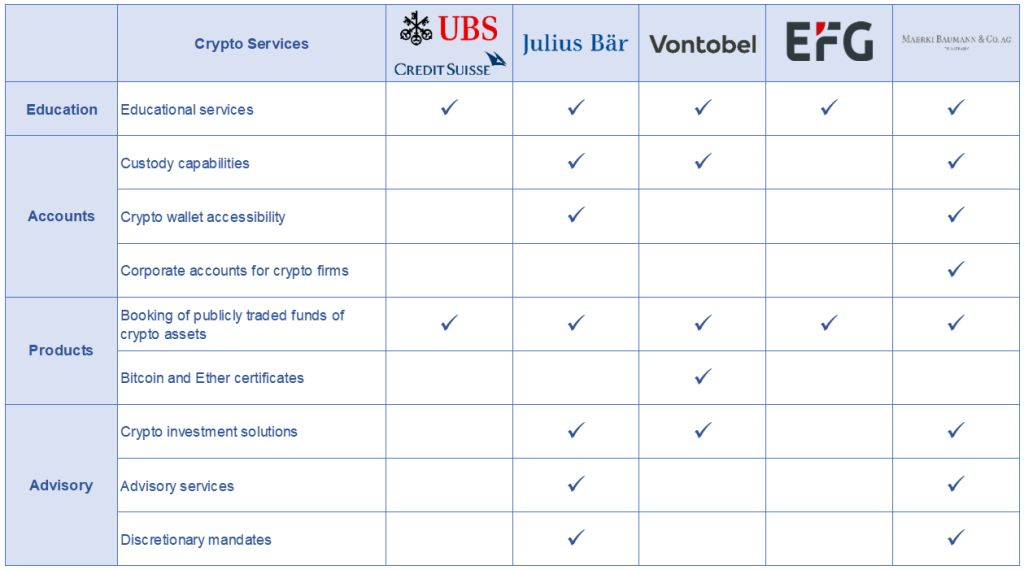The Integration of Crypto into the Offerings of Swiss Wealth Management Banks: My Perspective
In recent years, the offering landscape of financial investments across Swiss wealth management banks has undergone many transformations, also marked by the rising prominence of cryptocurrencies. These digital assets, which just ten years ago occupied a niche corner of the investment world, have steadily gained acceptance among a broad spectrum of (U)HNWI clients, even including institutional players. As cryptocurrencies continue to evolve, the elephant in the room remains: Will more Swiss wealth management banks start integrating crypto investments into their portfolios? Which bank is next?
The Growing Appeal of Cryptocurrencies
After the official end of the crypto winter, cryptocurrencies and their remarkable recent bull run have captivated the attention of investors around the world. The blockchain technology that underlies and powers cryptocurrencies offers a level of transparency, security, and efficiency not always present in traditional financial systems. As digital assets become increasingly mainstream, their inclusion in diversified (U)HNWI client portfolios should be a logical next step for Swiss wealth management banks.
The Role of Swiss Wealth Management Banks in Crypto Integration
Wealth management services provided by Swiss banks have traditionally focused on stocks, bonds, real estate, commodities, and more recently private market investments. However, the rapid growth and institutionalization of the crypto market – especially since the highly successful launch of a U.S. crypto ETF by Blackrock hitting USD 10b AUM in record time – and its burgeoning acceptance by (U)HNWI clients have made it increasingly impossible for Swiss wealth management banks to ignore. Client pressure to participate in the current bull run must be significant, as anecdotal evidence from my conversations with Relationship Managers suggests.
Recognizing the potential for significant returns – as well as the demand from (U)HNWI clients looking to diversify their portfolios – Swiss wealth management banks may be gradually warming up to the idea of incorporating crypto investments into their wealth management offerings.
A successful ZHAW Master’s study by my former student Ms Bruna Cabus, MSc in Banking & Finance, who serves as an Associate at the Swiss crypto-ETP-provider 21shares, last year explored the crypto offerings across the Swiss wealth management industry. She has come to the conclusion that crypto is “here to stay” in Swiss wealth management, and that behind the scenes, more Swiss wealth management (and retail) banks may be working on crypto offerings for their clients:

Not just in Switzerland with PostFinance, SGKB and LUKB, but around the world, many leading retail banks have taken steps towards embracing cryptocurrencies. Initiatives range from providing clients with research and analysis on digital assets to offering direct exposure through crypto funds or derivatives. These moves signal a growing acknowledgment within the industry that cryptocurrencies may indeed be “here to stay” and that they offer significant opportunities for growth and portfolio diversification.
Challenges and Considerations
The integration of crypto investments into (U)HNWI client portfolios of Swiss wealth management banks is, of course, not without its challenges. Ongoing regulatory uncertainty, volatility, security concerns, and the lack of standardized valuation methods for cryptocurrencies still pose significant hurdles. Banks venturing into the crypto space must still navigate a somewhat complex and opaque regulatory landscape, ensuring compliance while providing innovative investment solutions. A case in point: in a controversial blog post, the European Central Bank (ECB) has recently warned of a total crash of Bitcoin.
Moreover, the volatile nature of cryptocurrencies necessitates a sophisticated risk management approach by Swiss wealth management banks: they must develop and deploy a deep understanding of crypto market dynamics to advise their sophisticated (U)HNWI clients effectively and to mitigate potential risks associated with such high-risk-high-return investments.
The Crypto Future Appears Bright
The inclusion of crypto investments into the products and services of Swiss wealth management banks appears poised for growth, driven by significant client demand, the overall maturation of the crypto asset class, and a gradual shift towards regulatory certainty and assurance. As Swiss wealth management banks continue to explore and develop their crypto offerings, I expect a more structured and integrated approach towards crypto investments in traditional client portfolios.
For (U)HNWI clients, this evolution offers the potential to benefit from the high-growth opportunities of cryptocurrencies while relying on the expertise, risk management frameworks and – perhaps most importanly: banking licenses! – of reputed Swiss financial institutions. For Swiss wealth management banks, it represents an additional opportunity to innovate, attract a new and younger generation of clients, and stay competitive in a rapidly changing financial landscape.
My Conclusion: A New Asset Class is Born
In light of (yet another) unprecedented global bull run with Bitcoin topping USD 69k for a new all-time high, as well as an increasing institutionalization of the asset class, the question of whether Swiss wealth management banks shall or shall not integrate crypto investments into their products and services has become too pressing to ignore. While challenges remain, the trajectory suggests a growing acceptance and incorporation of crypto assets into traditional client portfolios.
As the crypto market continues to evolve, both (U)HNWI clients and Swiss wealth management banks will need to adapt, embracing the opportunities while navigating the complexities of this new asset class. Beyond a broadening of the investment space, the integration of cryptocurrencies into Swiss wealth management may signify a fundamental shift in the understanding and utilization of digital assets – not just in Switzerland, but in global finance.
